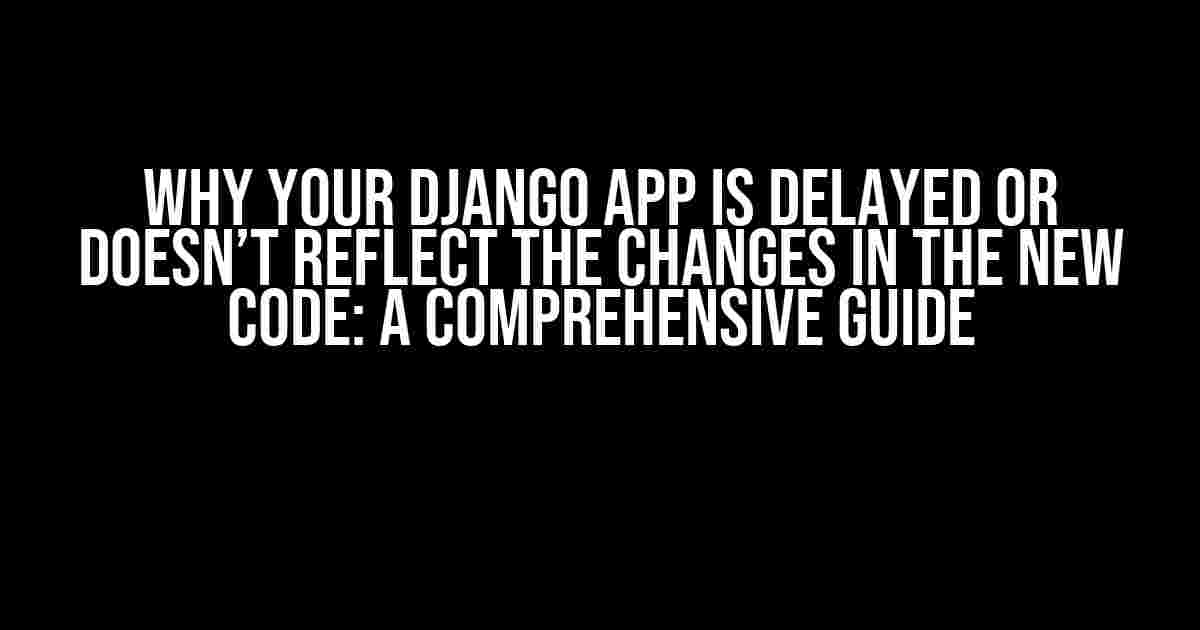Are you tired of wondering why your Django app isn’t updating despite making changes to the code? Do you find yourself frustrated with the delay in reflecting the changes? Don’t worry, you’re not alone! In this article, we’ll dive into the common reasons why your Django app might be delayed or not reflecting the changes in the new code, and provide you with actionable solutions to get your app up and running smoothly.
- Reason 1: Caching Issues
- Solution: Clearing Caches
- Reason 2: Virtual Environment Issues
- Solution: Managing Virtual Environments
- Reason 3: Database Issues
- Solution: Managing Database Changes
- Reason 4: Template Issues
- Solution: Managing Templates
- Reason 5: Deployment Issues
- Solution: Managing Deployment
- Conclusion
Reason 1: Caching Issues
Caching is a great way to improve your app’s performance, but it can also lead to delayed or non-reflective changes. Here are some caching-related issues that might be causing the problem:
- Browser Caching: Your browser might be caching the old version of your app, preventing you from seeing the changes. Try clearing your browser’s cache or using a private browsing window to see if that resolves the issue.
- Server-Side Caching: Django’s built-in caching might be caching the old version of your app. Check your
CACHESsetting in yoursettings.pyfile and make sure it’s not caching the wrong version. - CDN Caching: If you’re using a Content Delivery Network (CDN), it might be caching the old version of your app. Try invalidating the CDN cache or checking the CDN’s settings to ensure it’s not caching the wrong version.
Solution: Clearing Caches
To clear the caches, follow these steps:
- Clear your browser’s cache.
- Set
CACHESto an empty dictionary in yoursettings.pyfile: - Invalidate the CDN cache (if using a CDN).
- Restart your Django development server.
CACHES = {}
Reason 2: Virtual Environment Issues
Virtual environments can sometimes cause issues with Python packages and dependencies. Here are some virtual environment-related issues that might be causing the problem:
- Outdated Packages: Your virtual environment might be using outdated packages that don’t reflect the changes in the new code. Try upgrading your packages using
pip install --upgrade package_name. - Missing Dependencies: Your virtual environment might be missing dependencies required by the new code. Check your
requirements.txtfile and make sure all dependencies are installed. - Virtual Environment Not Activated: Your virtual environment might not be activated, causing the changes not to reflect. Activate your virtual environment using
source venv/bin/activate(for Linux/macOS) orvenv\Scripts\activate(for Windows).
Solution: Managing Virtual Environments
To manage virtual environments, follow these steps:
- Activate your virtual environment.
- Upgrade your packages using
pip install --upgrade package_name. - Check your
requirements.txtfile and install any missing dependencies usingpip install -r requirements.txt. - Deactivate your virtual environment and reactivate it to ensure it’s correctly configured.
Reason 3: Database Issues
Database issues can cause delayed or non-reflective changes in your Django app. Here are some database-related issues that might be causing the problem:
- Unmigrated Changes: You might have made changes to your models, but forgot to migrate them. Run
python manage.py makemigrationsandpython manage.py migrateto apply the changes. - Database Connection Issues: Your database connection might be faulty, preventing the changes from being reflected. Check your
DATABASESsetting in yoursettings.pyfile and ensure it’s correctly configured. - Database Caching: Your database might be caching the old version of your app’s data. Try clearing the database cache or using a different database engine.
Solution: Managing Database Changes
To manage database changes, follow these steps:
- Run
python manage.py makemigrationsto create migration files for your changes. - Run
python manage.py migrateto apply the migrations. - Check your
DATABASESsetting in yoursettings.pyfile and ensure it’s correctly configured. - Clear the database cache (if using a caching database engine).
Reason 4: Template Issues
Template issues can cause delayed or non-reflective changes in your Django app. Here are some template-related issues that might be causing the problem:
- Outdated Templates: Your templates might be outdated, causing the changes not to reflect. Try updating your templates using
python manage.py collectstatic. - Template Caching: Your templates might be cached, preventing the changes from being reflected. Try clearing the template cache or using a different template engine.
- Invalid Template Syntax: Your template syntax might be invalid, causing the changes not to reflect. Check your template syntax and ensure it’s correct.
Solution: Managing Templates
To manage templates, follow these steps:
- Run
python manage.py collectstaticto update your templates. - Clear the template cache (if using a caching template engine).
- Check your template syntax and ensure it’s correct.
Reason 5: Deployment Issues
Deployment issues can cause delayed or non-reflective changes in your Django app. Here are some deployment-related issues that might be causing the problem:
- Incorrect Deployment Script: Your deployment script might be incorrect, causing the changes not to reflect. Check your deployment script and ensure it’s correctly configured.
- Deployment Server Issues: Your deployment server might be experiencing issues, preventing the changes from being reflected. Check your deployment server’s logs and ensure it’s correctly configured.
- Version Control Issues: Your version control system might be causing issues, preventing the changes from being reflected. Check your version control system’s logs and ensure it’s correctly configured.
Solution: Managing Deployment
To manage deployment, follow these steps:
- Check your deployment script and ensure it’s correctly configured.
- Check your deployment server’s logs and ensure it’s correctly configured.
- Check your version control system’s logs and ensure it’s correctly configured.
- Try redeploying your app to ensure the changes are reflected.
Conclusion
In this article, we’ve covered the common reasons why your Django app might be delayed or not reflecting the changes in the new code. By following the solutions outlined above, you should be able to identify and resolve the issue causing the problem. Remember to always check your caching, virtual environment, database, templates, and deployment configurations to ensure they’re correctly set up.
| Reason | Solution |
|---|---|
| Caching Issues | Clear caches, set CACHES to an empty dictionary, invalidate CDN cache, and restart the Django development server. |
| Virtual Environment Issues | Activate virtual environment, upgrade packages, check requirements.txt, and deactivate and reactivate virtual environment. |
| Database Issues | Run python manage.py makemigrations, python manage.py migrate, check DATABASES setting, and clear database cache. |
| Template Issues | Run python manage.py collectstatic, clear template cache, and check template syntax. |
| Deployment Issues | Check deployment script, deployment server logs, and version control system logs, and try redeploying the app. |
By following
Frequently Asked Question
Are you stuck in a never-ending loop of frustration with your Django app? Don’t worry, we’ve got you covered! Check out these FAQs to get your app back on track.
Why is my Django app not reflecting the changes I made to the code?
This is probably because you forgot to restart your Django development server! When you make changes to your code, you need to restart the server to see the updates. To do this, simply press `Ctrl + C` in your terminal to stop the server and then run `python manage.py runserver` again to start it up.
I’ve made changes to my templates, but my app is still showing the old version. What’s going on?
This could be due to template caching. Django caches templates to improve performance, but this can sometimes cause issues. Try deleting the `__pycache__` directory in your app’s template directory or running `python manage.py collectstatic –clear` to clear the cache.
Why is my app taking forever to load or update?
This might be due to a slow database query or a computationally expensive operation in your code. Use Django’s built-in debugging tools, such as the `debug_toolbar` or `django-debug-toolbar`, to identify bottlenecks in your code and optimize them.
I’ve updated my models, but the changes aren’t showing up in my database. What did I miss?
You might need to run migrations to apply the changes to your database. Make sure you’ve run `python manage.py makemigrations` and `python manage.py migrate` to update your database schema.
I’ve tried everything, but my app is still not working as expected. What’s next?
Don’t worry, it’s time to bring in the big guns! Try debugging your code using `pdb` or a tool like `PyCharm` to step through your code and identify the issue. If you’re still stuck, reach out to the Django community or a mentor for help.



